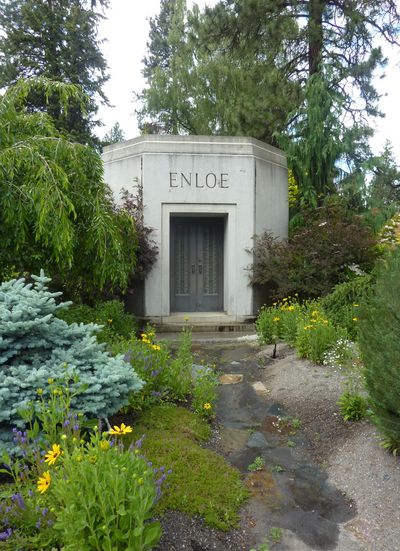Enloe helped electrify Eastern Washington

Just inside the big iron gates to Greenwood Memorial Terrace stands the Enloe family mausoleum. The structure itself is fairly simple, but it is surrounded by a number of trees, shrubs and flowers, creating a beautifully landscaped monument of remembrance to area pioneer Eugene Enloe and his family.
Enloe may not be among the best-known of the early Inland Northwest pioneers, but it is thanks to him that electricity was brought to many towns in Eastern and Central Washington. At one time he owned or controlled the systems that provided electricity for 45 towns in the greater Inland Northwest and was also the builder of hydroelectric power plants in Okanogan County and Canada.
Like so many pioneers before him, his was a rags-to-riches story. Born in Illinois in 1859, his early years included work in farming, merchandising, teaching, mining and serving as a postmaster. With his wife, Clara, some cattle and four of the seven children he and Clara would eventually have, he set out West to make a better life for his family. They settled in Medical Lake in 1891. He tried a brief stint managing a hotel in Wenatchee, but returned to Medical Lake, where he bought a bakery.
Newspaper accounts quote him as saying that he had but two horses and a few dollars and had to mortgage his house in order to buy inventory when he expanded the bakery into a general merchandise store. One report states that before selling his Medical Lake business he was generating $100,000 in sales annually.
His store first focused Enloe’s attention on electricity and power generation. He was quoted as saying it was because he had so much trouble with lights in his store that he recognized the need for good electrical service.
He induced the Washington Water Power Co. to build a line to Medical Lake, and he took over the contract for operation of that line. From there he branched out, organizing the Big Bend Light and Power Co. and Okanogan Valley Power Co., the latter of which entailed construction of dams and power generating plants on the Similkameen River near Oroville and on the Methow River at Pateros, with distribution lines extending from Oroville to Mansfield. These enterprises, including the one in Medical Lake, were sold to WWP. He also created power plants in Drumheller and Wayne, Alberta, which he sold in 1928 for $1 million.
In one newspaper story, he was asked how to become successful, and he replied: “No young man will want to listen to my advice. My formula isn’t popular. It is to work, not only eight hours a day, but 18 hours. And save your money.”
Enloe was also prominent in Spokane, most visibly perhaps in 1926, when he bought the Patsy Clark mansion in Browne’s Addition and moved there with his family. He was active in real estate enterprises and was also generous to his community. In 1937, he gifted the old Spokane Amateur Athletic Building at Main Avenue and Monroe Street downtown to the YWCA, which became its home for the next 28 years.
Ever expanding his interests – and willing to work hard – he was president of the Idaho Portland Cement Co., the Enloe Electric Co. in Rosalia and the Enloe Investment Co. (a security holding firm), among others. He was head of the Spokane Realty Co. and a director at WWP, the Inland Empire Paper Co., Continental Coal Co. and others. In 1932, he was elected president of Washington Trust Bank, and he was a member of the Spokane Country Club, Spokane City Club and U.S. Chamber of Commerce.
He died in 1945, just a few months after his wife passed away, and both are interred in the mausoleum, as are some of their children and other relatives.